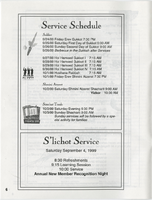Search the Special Collections and Archives Portal
Search Results

Transcript of interview with Flora Mason by Barbara Tabach, December 8, 2014
Date
Archival Collection
Description
Flora Mason (1940- ) is a Las Vegas, Nevada philanthropist and community leader. She was born Florica Esformes to a Sephardic Jewish parents who emigrated from Greece to New York. This Mediterranean influence can be seen in the meals she serves for the Jewish holidays. Flora?s grandfather had a pushcart business in New York and her father became a produce broker, which led the family to Miami, Florida. She graduated from high school in Miami and also met Stuart Mason there. The young couple married in 1958. They had been married for 58 years when Stuart passed away in 2012. In this oral history, Flora recalls her life?from witnessing signage that read: no blacks, no dogs, no Jews in the South to meeting her husband while a teenager to raising her three children in Las Vegas. Along the way, she has always found time to form fast friendships and to inspire productive community organizations. v For example, Flora and Stuart founded the Las Vegas Chapter of the Juvenile Diabetes Foundation in 1970. It was a disease that their daughter Deborah had suffered from. They also established the Mason Undergraduate Peer Coach Program at University of Nevada, Las Vegas Libraries in 2006. Flora was the first woman elected by the general membership to serve on the Temple Beth Sholom Board of Directors. She has served on the National Board of Directors of the Juvenile Diabetes Research Foundation, been involved with the Jewish Federation of Las Vegas, the Anti-Defamation League among many other Jewish and non-Jewish community organizations. Flora?s college education began at the University of Miami and focused on completing both her undergraduate and graduate degrees at UNLV, where she majored in English literature. She then became a lecturer in the UNLV English department from 1985 to 1993. Flora and Stuart Mason had three children: sons William and James who joined the family?s successful three-generation commercial construction business Taylor International, and daughter Deborah. In this oral history, Flora shares the joy of being a grandparent, her love of travel, and the opportunities of meeting Israeli dignitaries over the years. She also candidly reflects on dealing with grief and the Jewish rituals surrounding death.
Text

Transcript of interview with Jerry Engel by Barbara Tabach, March 1, 2016
Date
Archival Collection
Description
Jerry Engel was born in 1930 in New Jersey and spent most of his early life in Long Beach, New York until the family moved westward to Las Angeles. Jerry is a retired Certified Public Accountant and loves to talk about the history of Las Vegas that he observed since arriving in 1953. That was the year that he moved to Las Vegas to join his older brothers, Morris and Phil, in their accounting firm. Their major client at the time was Desert Inn. Another personal connection with local history: the Engel brothers? mother, Esther Katz Engel, was among the early investors in the Moulin Rouge hotel/casino enterprise. Jerry graduated with honors from University of California, Los Angeles in 1951. His accounting career in Las Vegas is highly regarded and he continues to maintain a consulting practice. He remains active within the community and enjoys doing presentations based on his memories of Las Vegas history. Within this interview, Jerry highlights people, casinos and other observations of local history that he came into contact with over the decades. He provides insights about the role of an accountant in the gaming industry. He also discusses the influence of Jewish business leaders in and array of local gaming and non-gaming issues, including the retail world, Jim Crow era segregation, and the astonishing growth of the valley over six decades.
Text

Transcript of interview with Todd S. Polikoff by Barbara Tabach, August 30, 2016
Date
Archival Collection
Description
In 2015, Todd S. Polikoff was named the President & Chief Executive Officer of the Jewish Federation of Las Vegas. (The organization is now known as Jewish Nevada). Todd is a graduate of Stockton University and earned his MBA at Cleveland State University. He has three children: Samuel, Shira and Jordan. Born in 1971 to a steelworker and hairdresser, Jack and Judy Polikoff, Todd grew up in Philadelphia, became a bar mitzvah there, and shocked his mother when he explained he was putting college on hold to move to Israel. In addition to stories about these life memories, Todd also traces his career path to decision-making to a meaningful trip to Moscow a where a defining moment helped him understand his own relationship with Judaism. To the time of this interview, Todd has invested over twenty years in leadership of Jewish Federation and AIPAC in states that include New Jersey, Delaware, Texas, Ohio and Nevada.
Text

Transcript of interview with Milton I. Schwartz by Claytee White, May 4, 2004
Date
Archival Collection
Description
In this interview, Milton Schwartz discusses his life in Las Vegas and his business investments. He worked at the Flamingo Hotel right after World War II, and he started Valley Hospital as an investor in 1970. Schwartz has a Hebrew academy named after him in Israel, and owned the Yellow-Checker-Star Cab Company. He was active in the Republican Party.
Milton I. Schwartz was born and raised in Brooklyn, New York. He enlisted in the Army the day after Pearl Harbor (age 20) and did a five year stint in the Pacific as a repeater specialist. After the war he returned to his job as a refrigeration mechanic in Brooklyn and was soon offered a job out in Las Vegas at the Flamingo Hotel, which was owned by Bugsy Siegel. After three months in Las Vegas, during which time he had several conversations over dinner with Beldon Cattleman, Milton returned to New York to work with his father in the fixture business. After ten years he sold that business and bought into Design Equipment Construction, which brought him back to Las Vegas. Milton started or bought many businesses over the years, but the one he's proudest of is Valley Hospital. He and his partners brought the first medical helicopters into Nevada and he feels that many lives were saved because of that. He also invested in Yellow-Checker-Star Cab Company, which he still owns. Two on-going concerns that are important to Milton are his involvement with the Republican Party and the Milton I. Schwartz Hebrew Academy in Israel. Of the many awards and plaques he has earned over the decades, he is proudest of the birthday acknowledgements from the Academy. He believes strongly that the most important achievements of his life revolve around his religion and the children being educated in it. Milton shares many stories, facts, descriptions, and anecdotes about Las Vegas in the decades since 1946. He built a house in the Scotch 80's, contributes to UNLV, and approves of city growth and the proposed changes in the downtown area. He has contributed much to the growth and stability of the Las Vegas valley.
Text

Transcript of interview with Phyllis Friedman by Barbara Tabach, March 2, 2015
Date
Archival Collection
Description
In this interview, Phyllis Friedman reflects upon her extensive work with the ADL in Las Vegas. She discusses the city?s relatively low anti-Semitic activity, and how this allowed the Las Vegas ADL office to focus its efforts more broadly than in other cities. She also touches upon her family history, and how the community of Las Vegas has evolved since first visiting in 1963.
A Chicago native, Phyllis Friedman first came to Las Vegas in 1996 to become the Jewish Federation of Las Vegas? first foundation director. After two years, Friedman moved to year Los Angeles to work for ORT. Itching to get back to Las Vegas, in 2007, Friedman returned to the city to became director of the Nevada regional office of the Anti-Defamation League (ADL). In this position, she worked with schools as well as law enforcement, including the Federal Bureau of Investigation (FBI), teaching about tolerance and justice. She is a recipient of the FBI?s Las Vegas Division Director?s Community Leadership Award as well as the first awardee of Jewish Federation?s Jewish Professional of the Year. Three weeks into retirement, Friedman gave this interview, reflecting upon her extensive work with the ADL in Las Vegas. She discusses the city?s relatively low anti-Semitic activity, and how this allowed the Las Vegas ADL office to focus its efforts more broadly than in other cities. She also touches upon her family history, and how the community of Las Vegas has evolved since first visiting in 1963.
Text

Frieda Steinberg interview, September 10, 2014, November 10, 2014, August 15, 2017: transcript
Date
Archival Collection
Description
Interviewed by Barbara Tabach.
Text

Transcript of interview with George Levine by Barbara Tabach, April 16, 2015
Date
Archival Collection
Description
In this interview, George reflects upon his life in Las Vegas, particularly the period as ma?tre d? of the Sand?s Copa Room. Joined by his daughter - and former United States Democratic Congresswomen-Shelley Berkley, George shares stories of working in the gaming industry during this unique era, including those of Frank Sinatra and Wayne Newton. He also talks about his life as a professional gambler.
Born on February 28, 1925 in Sommerville, New Jersey, George Levine?s family moved to his childhood home, Manhattan?s Lower East Side, when he was six months old. George served on a United States Navy aircraft carrier for thirty months during World War II. After returning home, he met his first wife Estelle, with whom he had two daughters, and soon moved to Kiamesha Lake, New York to work at the Concord Resort Hotel. In 1963, George and his family moved to Las Vegas and took his first job at Mr. Sy?s Casino. Six months later he began waiting tables at the Sands Hotel and Casino. He worked his way up the ranks and was ma?tre d' from 1979 until the hotel closed in 1996.
Text

Transcript of interview with Justice Michael Cherry by Barbara Tabach, September 19, 2014
Date
Archival Collection
Description
Interview with Justice Michael Cherry by Barbara Tabach on September 19, 2014. In this interview, Justice Cherry talks about how he came to Las Vegas and his work as a public defender and as a lawyer in private practice. He also discusses his involvement with Jewish organizations in various capacities, and his involvement with high-profile cases such as the MGM Grand and Las Vegas Hilton fires, earning him the nickname "master of disaster."
Justice Michael Cherry was born in St. Louis, Missouri, and went on to spend his childhood in the Jewish neighborhood of University City. He attended University of Missouri and became a leader in his fraternity, Alpha Epsilon Pi, and a committed ROTC cadet. By the time Justice Cherry graduated from Missouri and was heading to Washington University School of Law, he was a second lieutenant; halfway through law school, he was promoted to first lieutenant. It was also during law school that he married his college sweetheart, Rachel Wolfson. When a bad back prevented him from becoming an active air force officer, he and his wife decided to follow his mother to Las Vegas. Justice Cherry worked both as a law clerk with the Public Defender's Office as well as a security guard at Wonder World when he first moved to the city. After passing the Nevada bar, Cherry took at position with the Public Defender's Office, and later went into private practice as a successful criminal defense attorney. Cherry was elected as district judge in 1998 and 2002. In 2006, he won his campaign for state Supreme Court justice. Justice Cherry was reelected to office in 2012 for another four-year term. He is currently the highest-positioned Jewish official in the state of Nevada. Throughout his years in Las Vegas, Justice Cherry has been an extremely active and influential member of the Jewish community and served as chairman of the Anti-Defamation League and is active in the Jewish Federation. Justice Cherry attributes his commitment to service to his mother. In addition to his service to the Jewish community, he has been active in numerous other service organizations, including March of Dimes, Olive Crest, Adoption Exchange and American Cancer Society.
Text


